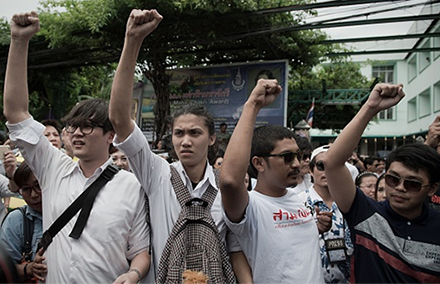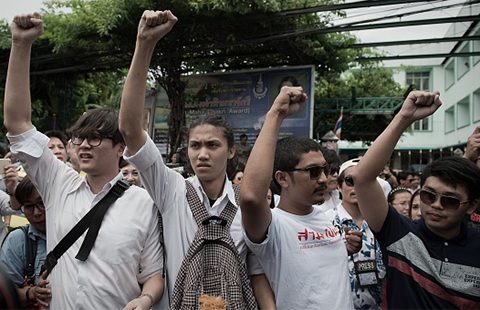
Student-led protest could help break long-term political stalemate, according to a recent piece by Tyrell Haberkorn.
In late June and early July the fate of 14 Thai university students and graduates who had peacefully demonstrated against the ruling junta on the one-year anniversary of the country’s latest coup captured global attention.
As the demonstrators languished in a Bangkok prison, social media spread messages of solidarity from scholars and citizens at home and abroad, as well as calls to ‘Free the 14’.
The European Union and UN urged Thailand’s National Council for Peace and Order to release the protestors. International rights groups condemned the country’s leaders, highlighting yet another worrying turn for political freedom in the Southeast Asian nation.
After 12 days behind bars, on 8 July the students and graduates, now known as the ‘Thai 14’ walked out of prison.
And as regular New Mandala contributor Tyrell Haberkorn notes, something extraordinary then happened; they vowed to continue their fight against Thailand’s interim Prime Minister General Prayuth Chan-ocha.
In an article at Dissent, Haberkorn notes that while the 14 are currently free, their release is only a reprieve.
“They face possible prosecution and up to six months further imprisonment for the protest, and another seven years imprisonment for the vague accusation of sedition. The military government could choose to resume the case against them at any time,” she writes.
Nonetheless, they have promised to fight on via what has been labelled the New Democracy Movement (NDM), saying they would continue to use peaceful means to demand democracy. This has given long-time Thailand watcher Haberkorn some hope for the country’s future.
“NDM represents both the most significant protest movement against the military junta to emerge and the most viable possibility to end the political deadlock that has dominated Thai society since the September 2006 coup,” writes Haberkorn.
“One reason is that NDM may be able to bridge the social, economic, and political inequality that festers in the gap between urban and rural citizens. Another reason is that NDM is not connected to any political party or figure and stands outside the color-coded politics of the last eight years. NDM simply calls for an end to dictatorship and for upholding the rule of law, a law that should not only apply to all but that is also just.
“What is equally important is that the release of the members of NDM came after both sharp international criticism, but, more threatening to the junta, widening domestic opposition. This began when students’ professors and parents began visiting them daily and citizens organised nightly candlelight vigils outside the prison.”
Tyrell Haberkorn is a fellow in political and social change at the Australian National University’s Coral Bell School of Asia Pacific Affairs. She is the author of ‘Revolution Interrupted: Farmers, Students, Law and Violence in Northern Thailand’.
Read her full article and analysis on Thailand’s New Democracy Movement at Dissent. A Thai translation is available at Prachatai.
 Facebook
Facebook  Twitter
Twitter  Soundcloud
Soundcloud  Youtube
Youtube  Rss
Rss 